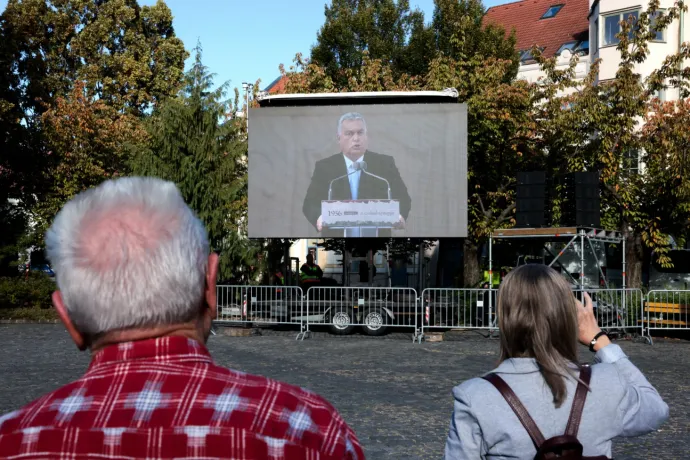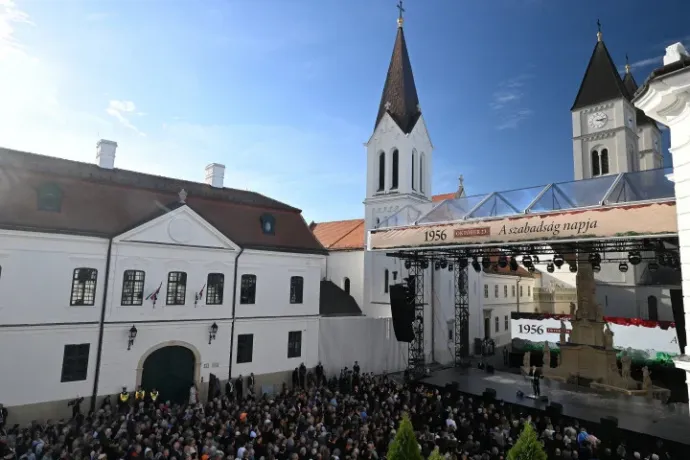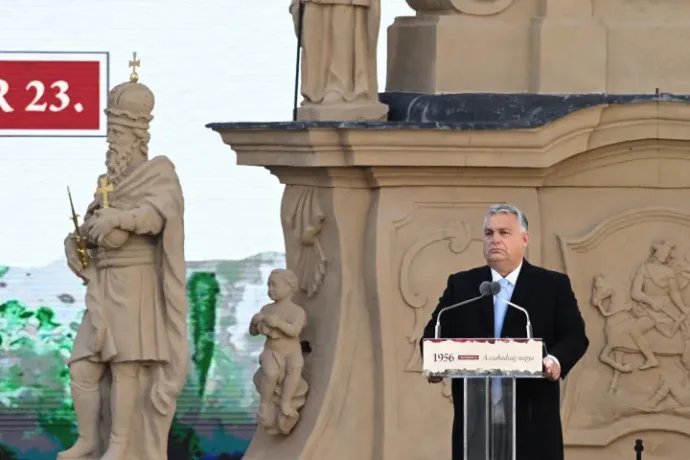
23 October is one of the most important days for the Hungarian nation. It is the anniversary of the Hungarian people's defeated uprising against Soviet oppression in 1956. Although traditionally, the country's leader had always given a speech at a central commemoration held in Budapest, this year, Prime Minister Viktor Orbán broke with that tradition again, and chose to speak in front of a smaller crowd outside of the capital.
As of recently, Orbán prefers to choose who he celebrates with
"Good afternoon, people of Veszprém, good afternoon, Hungary!" thus began the Hungarian Prime Minister's speech on 23 October, the organizing of which was in many ways unusual.
On recent state holidays Viktor Orbán has chosen to leave the capital and its symbolic locations, and give a speech in one of the rural towns instead. Last year, on 23 October, he spoke in Zalaegerszeg and he chose Kiskőrös, the birthplace of renowned Hungarian poet Sándor Petőfi for his speech on 15 March this year.
This time he chose Veszprém and, just as on the two previous occasions, he celebrated in front of a select audience, with access to the castle of Veszprém reserved only for those who had previously registered. Even the specific location was not revealed in advance.
A year ago, the press was allowed in after registration, but this year the Prime Minister's staff did not allow this either: his Press Chief, Bertalan Havasi, said that the press would not be allowed in this time, and that the Prime Minister's speech could be followed via the public media.
This is certainly an unusual move from Viktor Orbán, who has previously defined himself as a street fighter, but whose staff has become more and more keen to avoid unexpected situations or even the organisation of protests of any kind. (Not that any opposition grouping had planned to do anything like that this time. Opposition party ,Momentum for example sprayed red paint on the security cordons in front of Orbán's office in Budapest, far from Veszprém.) Monday’s speech was also rather unique in that it was unusually short: it barely lasted half an hour.
Talking only about the capital is a mistake
The reason for his visit to Veszprém was that the city is currently the European Capital of Culture, and Orbán also referred to the city's connection to the events of 23 October. He said that in 1956, "the people of Veszprém did not wait for the people of Pest, but formed their revolutionary organisations and formulated their demands as early as 22 October. This is not surprising, as that's simply the way Veszprém is, it likes to get ahead of things," he said.

At the same time, Orbán said that '56 was the whole nation’s common struggle for freedom, because in the retaliation following its crushing, those who were executed included priests, teachers, farmers, leaders from the communist party, elderly, young, women, men, residents of both Budapest and the countryside alike. As Orbán said, every town and village in Hungary has its own 1956, "and each of these is part of our great common '56 struggle for freedom."
He added that this is why it is patronizing and a mistake to "only talk about Budapest being in the limelight" on 23 October.
With this, Orbán took a swipe at those speakers who only refer to the events in Budapest in their commemorations on this day, but – a few months before the municipal elections – he also wanted to emphasise how much he regretted everything being centred on the capital. Given Fidesz's high popularity in the countryside and its more moderate popularity in Budapest, this is not surprising.
Once again, there was plenty of Brussels-bashing
The speech Orbán gave on 15 March this year was particularly surprising because he had made no reference to current politics whatsoever while talking about Sándor Petőfi and the 1848 revolutionaries. However, the Prime Minister more than made up for the omission this time, as his address was full of references to current political affairs.
According to Orbán, for example, history keeps repeating itself, because those we have saved or defended are the ones repeatedly attacking us. “Once again, we were the first to protect Europe from migration and we proposed peace instead of war, which could have saved hundreds of thousands of lives. But we've never received thanks, appreciation or goodwill in return. Instead, we've often been reproached or attacked from behind.”
Orbán said that we also wanted freedom in '56. And we are free indeed, with Europe united in the spirit of freedom. But we mean different things when we think of freedom and we have different concepts of what a free world should be.
"For the Westerners, freedom means escape: get rid of yourself, get rid of what you were born as, change your nation, change your gender, change your identity", Orbán went on and on, criticizing Western social processes for several minutes.
"The thought of not being male, Christian and Hungarian is like having your heart ripped apart." Freedom, Orbán said, means accepting that you were born a Christian, a Hungarian. According to Orbán, we are not willing to give this up either at the request of Brussels or Moscow.
For us, freedom is a survival instinct, my family, my homeland, I am all those things. The struggle for freedom is not something to be embarked on, it's a given, Orbán said, adding that even St Stephen (founder of Hungary and its first king – TN) knew this, and Hungarians still know it today, for "we have stood at the tomb of every occupying empire".
As a way of summary, in the second half of his speech, Orbán arrived at specifically bashing Brussels. "Fortunately, Brussels is not Moscow", Orbán declared, using the same phrase as in 2011. Although later, in 2020 he said that "there isn't much more missing" before Brussels becomes Moscow. This time Orbán said:
“History sometimes repeats itself, but fortunately, what was a tragedy the first time is a farce the second time around. Moscow was a tragedy, Brussels is just a contemporary parody gone wrong. And when Moscow played a tune, we had to dance accordingly, but we don't dance if we don't want to when Brussels starts playing its tune.”
It is likely that Orbán's inspiration for this thought came from the film The Witness, (a cultic 1969 Hungarian film banned for a long time for criticizing the communist regime in Hungary -TN) which ends with a quote from Marx: "Why does history go on like this? So that mankind may cheerfully part with its past." Orbán's current sentence definitely echoes the quote from Marx, according to which “history repeats itself, and what was once a tragedy is now a comedy, and humankind laughs as it bids farewell to its unpleasant past.”
Orbán went on to say that the 'lectures from comrades' are still there today, only now these reprimands from the single-party state are called conditionality procedures and rule of law procedures. Continuing the parallel, he said: this time it's not tanks rolling in from the east, but dollars from the west, however, they still go to the same places and to the same people.
According to the Prime Minister, the Soviet Union was hopeless and beyond repair, but the European Union is not, as the EP elections are coming up next year. “Europe is still alive, still breathing, there is still vital energy working in its body.”
The Hungarian genius
At the beginning of his speech, Orbán spoke of the heroic martyr of Veszprém, Árpád Brusznyai, who was a secondary school teacher executed after the 1956 revolution was defeated. According to the Prime Minister, Brusznyai's fate is a typical Hungarian fate. He then went on to list the virtues of the Hungarians: responsibility for our neighbours, an unrelenting sense of justice, as well as justice and chivalry towards our enemies, he said.
According to Orbán, although Brusznyai was innocent, they killed him, cast lots for his garment, and persecuted his memory in an attempt to erase it, and succeeded in doing so for three decades. The Prime Minister, for example, hadn't even heard of him when he was in high school.
According to the Prime Minister, Brusznyai understood the times and knew that if history had dealt a card to the Hungarians again, it had to be taken up. He understood that for a long time to come, 1956 was the last chance for European Hungary to do what the Austrians had done in 1955, to tear itself away from the world of Bolshevik socialism, which denied European culture, Christian civilisation and the right of nations to existence.

According to Orbán, the Hungarian Revolution and struggle for freedom was not an inarticulate howl, or an unbridled outburst of the desire for freedom, but – despite all its heroism – a sober, measured and responsible revolution.
"The revolution was an expression of the Hungarian genius."
– said Orbán, who has talked about how much he believes in the "peculiar wit" of Hungarians several times during the past thirteen years.
He didn't fail to mention the traitors of Hungary
"We know that traitors are part of our nation, they are there in our history too, just like "ill fate" in our anthem. Where height exists, there are also valleys," Viktor Orbán said in the middle of his speech, leaving no doubt that he considered his current political opponents to be the heirs of the communists of 1956.
Orbán said that the only way for the communists to enter the era of democracy in 1989 was if they had first confessed to their biggest crime. But as soon as they did, they lost their power. According to Orbán, all we had to do in 1989 was to finish what was started in 1956: to show that thirty years of enforced silence did not equal forgiveness, and that the debt would have to be paid sooner or later.
"Thirty years later, having seen the inadequacy of democracy on the question of justice, Hungarians are still debating whether they had made the right decision," Orbán said, adding that one thing is certain though: in Hungary, the communists were replaced without a civil war and without a single person dying. There was no need for early elections, and Orbán said it was also certain that
"to this day, we remain the safest and most stable country in Europe".
At the same time, he believes that the communist leaders played a major role in the bloody suppression of the 1956 revolution. He also referred to his current political opponents, first MSZP (Hungarian Socialist Party) and then the other left-wing parties. "As far as I can see, the successor party to the MSZMP (Hungarian Socialist Workers' Party) is now microscopic in size, and the last left-wing party is ending up where the spirit of 1956 demands it should end up," Orbán pointed out.
For more quick, accurate and impartial news from and about Hungary, subscribe to the Telex English newsletter!